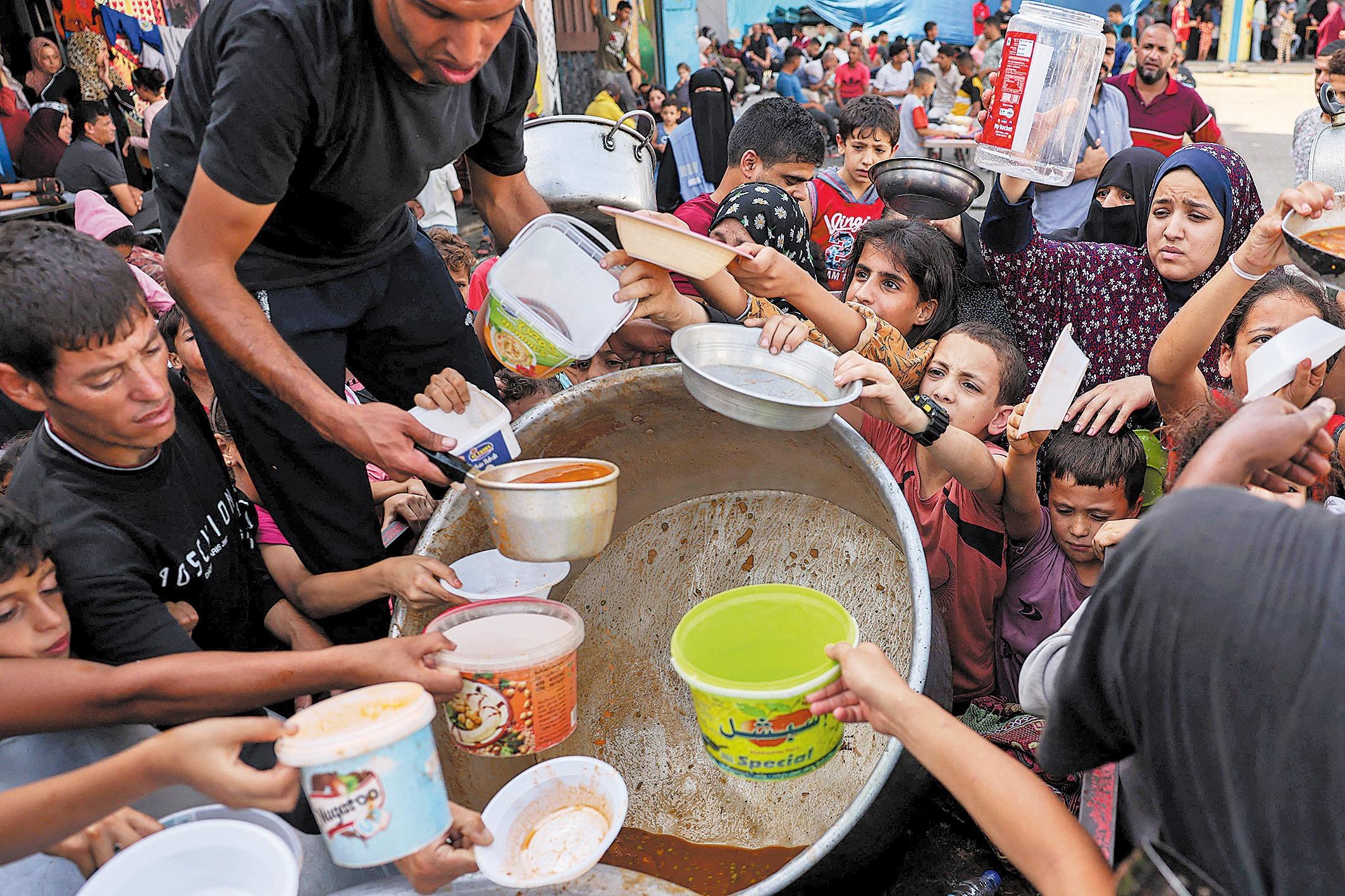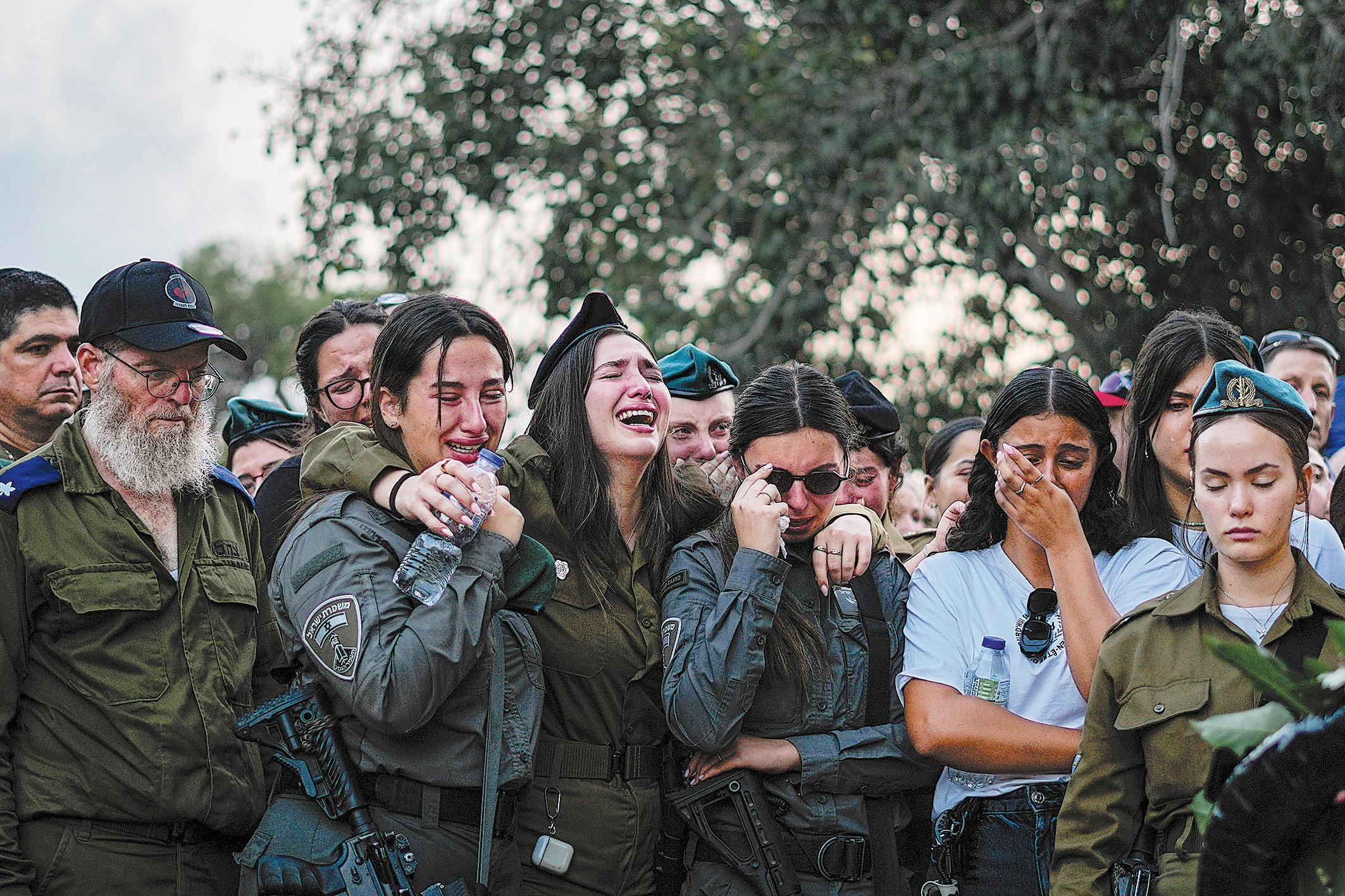FM Wang speaks to Palestinian and Israeli counterparts in latest efforts to end hostilities, humanitarian crisis
 Palestinians wait to receive food on Oct 23, 2023 at a United Nations school in Rafah in the southern Gaza Strip. Israel has cut off supplies of water, electricity, fuel, and food to the Palestinian enclave of 2.4 million people since the start of the conflict. (PHOTO / AFP)
Palestinians wait to receive food on Oct 23, 2023 at a United Nations school in Rafah in the southern Gaza Strip. Israel has cut off supplies of water, electricity, fuel, and food to the Palestinian enclave of 2.4 million people since the start of the conflict. (PHOTO / AFP)
Foreign Minister Wang Yi spoke by phone on Oct 23 with his Palestinian and Israeli counterparts, driving China’s latest efforts to end hostilities and restore peace in the Gaza Strip.
During his conversation with the Palestinian foreign minister, Riyad Al-Maliki, Wang expressed deepest sympathies for the people caught up in the conflict.
“What Gaza needs most is peacemaking efforts, not geopolitical calculation,” he said, adding that China has provided emergency humanitarian assistance to the strife-torn region and will continue doing so.
Al-Maliki expressed his gratitude to China for upholding justice with a clear and strong voice.
During his conversation with Israeli Foreign Minister Eli Cohen, Wang said that all countries have the right to self-defense, but they should respect international humanitarian law and not jeopardize the safety of civilians.
“China is deeply concerned about the continued escalation of the conflict and is deeply saddened by the large number of civilian casualties. The top priority now is to prevent the situation from further escalating and causing a more serious humanitarian disaster,” he said.
Cohen gave Wang an update on Israel’s position on the conflict and its security concerns. Wang said the Palestine-Israel conflict affects the whole world and represents a major choice between war and peace.
The painful lessons of the recurring Palestine-Israel conflict fully demonstrate that sustainable security can be achieved only by adhering to the concept of common security, Wang said, adding that political settlement is the only way to thoroughly address Israel’s legitimate security concerns.
“China will firmly support any move that is conducive to peace and will do its best as long as it is conducive to the reconciliation between Palestine and Israel,” he added.
The foreign minister urged the United Nations Security Council to shoulder its responsibilities and called on the international community to take urgent action.
Countries outside the region, especially major powers, should remain impartial and play a constructive role in de-escalating the crisis, Wang said.
China sincerely hopes that a comprehensive and fair solution to the Palestinian question can be found on the basis of the two-state solution and by the realization of the Palestinian people’s right to existence and statehood.
Since the outbreak of the current conflict, China has maintained close communication with relevant parties, actively participated in Security Council consultations, and made every effort to promote peace talks and help de-escalate the situation.
Zhai Jun, China’s special envoy on the Middle East issue, is currently touring several Arab countries, engaging in shuttle diplomacy.
He arrived in Doha, the capital of Qatar, on Oct 19 where he held a series of talks, including with Mikhail Bogdanov, Russia’s deputy foreign minister and special presidential representative for the Middle East and Africa, and Mohammed bin Abdulaziz bin Saleh Al Khulaifi, Qatar’s minister of state at the Ministry of Foreign Affairs.
“The fundamental reason for the current situation in the conflict is that the legitimate national rights of the Palestinian people have not been guaranteed,” Zhai told Bogdanov.
Noting that China and Russia hold the same position regarding the Middle East issue, Zhai said Beijing is willing to work with Moscow to promote the two-state solution and push for an early, comprehensive, just and lasting settlement of the issue.
When speaking to Khulaifi, Zhai said Qatar wields significant influence over the Israeli-Palestinian issue and China is willing to coordinate with Qatar to play a constructive role in easing the tension.
Foreign Ministry spokeswoman Mao Ning said on Oct 24 that the international community, especially the Arab world, has hailed China’s just position and the role it has played as a responsible major country.
She added that more than 1,000 Chinese citizens have left Israel and have returned to China or traveled to a third country since the outbreak of the conflict on Oct 7.
 Mourners gather on Oct 23 around the graves of Sergeant Yam Goldstein and her father, Nadav, during their funeral in Kibbutz Shefayim, Israel. Yam and her father were killed by Hamas militants on Oct 7, 2023. (PHOTO / AP)
Mourners gather on Oct 23 around the graves of Sergeant Yam Goldstein and her father, Nadav, during their funeral in Kibbutz Shefayim, Israel. Yam and her father were killed by Hamas militants on Oct 7, 2023. (PHOTO / AP)
Amid rapidly expanding Israeli airstrikes across the Gaza Strip and the mounting death toll, a United Nations agency put the number of internally displaced people in the Gaza Strip at an estimated 1.4 million.
Meanwhile, the Palestinian Islamic Resistance Movement, or Hamas, on Oct 23 released two elderly hostages, taking the total number of those freed to four.
Israeli citizens Yocheved Lifshitz, 85, and Nurit Cooper, 79, were allowed to return home for “humanitarian reasons” and following “Egyptian-Qatari mediation”, according to Al-Qassam Brigades, the military wing of Hamas.
On Oct 20, Hamas freed two Israeli American women, but was still believed to be holding more than 200 Israelis and foreign citizens hostage.
In a briefing to reporters, Israel Defense Force spokesman Daniel Hagari said on Oct 23 that the military “has been actively involved in operational and intelligence efforts to secure the release of all the hostages”.
As the airstrikes intensified, the Israeli army prepared for a potential ground offensive, deploying tens of thousands of troops.
The IDF also carried out limited ground raids in the Gaza Strip. “During the night, there were raids by tank and infantry forces,” Hagari told reporters during a daily briefing on Oct 23, adding that the raids were carried out “deep” in the Gaza Strip.
Fighting also continued along Israel’s northern border with Lebanon. As sporadic clashes were reported between Hezbollah, an Iran-backed Islamist group, and Israeli forces, a prominent Lebanese politician said on Oct 24 that Lebanon will not initiate a war with Israel, but it will defend itself if attacked.
The conflict could deal a “serious” blow to global economic development, Ajay Banga, president of the World Bank, told an investor conference in Saudi Arabia on Oct 24.
“What just happened recently in Israel and Gaza — at the end of the day you put all this together, I think the impact on economic development is even more serious,” Banga said, adding: “I think we’re at a very dangerous juncture.”
Meanwhile, French President Emmanuel Macron arrived in Israel on Oct 24, met with high-level Israeli officials, and warned against the risks of a regional conflict.
After meeting with families of French citizens who were killed or held hostage, Macron told Israeli President Isaac Herzog that France stood “shoulder to shoulder” with Israel.
Standing beside Prime Minister Benjamin Netanyahu later, Macron stressed Israel’s right to defend itself in its war against Hamas.
“The fight must be without mercy, but not without rules” because democracies “respect the rules of war”, Macron said, adding that democracies do not target civilians.
The office of Palestinian President Mahmoud Abbas said Macron would also meet the Palestinian leader in Ramallah, West Bank.
Macron’s visit comes after European Union foreign ministers struggled on Oct 23 to agree on a call for a “humanitarian pause” in the conflict to allow more aid to reach civilians.
The UN Office for the Coordination of Humanitarian Affairs said 20 trucks crossed the Rafah border point into the Gaza Strip on Oct 23. Half of the trucks were carrying UN supplies — water, food, and medicines.
Planes from Algeria, Kuwait, Iraq, the United Arab Emirates, and the World Health Organization carrying humanitarian aid for the Gaza Strip arrived at Egypt’s Al-Arish Airport, which is less than 50 kilometers from the Rafah crossing.
Amid the huge number of displaced people in Gaza, nearly 580,000 were being housed in 150 shelters designated by the United Nations Relief and Works Agency.
Humanitarians warn about overcrowding, as the average number of people per shelter has reached more than 2.5 times its capacity.
As of Oct 24, nearly 6,000 people in Palestine and more than 1,400 in Israel are reported to have been killed since the conflict started on Oct 7.
Jan Yumul in Hong Kong and agencies contributed to this story.


